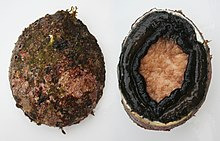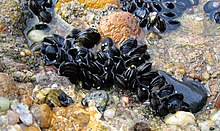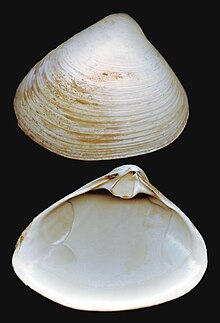List of edible molluscs

This is a partial list of edible molluscs. Molluscs are a large phylum of invertebrate animals, many of which have shells. Edible molluscs are harvested from saltwater, freshwater, and the land, and include numerous members of the classes Gastropoda (snails), Bivalvia (clams, scallops, oysters etc.), Cephalopoda (octopus and squid), and Polyplacophora (chitons).
Many species of molluscs are eaten worldwide, either cooked or raw. Some mollusc species are commercially exploited and shipped as part of the international trade in shellfish; other species are harvested, sold and consumed locally. Some species are collected and eaten locally but are rarely bought and sold. A few species of molluscs are not commonly eaten now, but were eaten in historical or prehistoric times.
The list is divided into marine and non-marine (terrestrial and freshwater) species, and within those divisions, the lists are primarily arranged taxonomically, so that related species are grouped together.
Marine species
Gastropods (snails)
These sea snails are edible; some are listed by genus, others by species and others by their common name.
Most species of abalone, including:[1]

- Abalone
- Black abalone
- Blacklip abalone
- Green abalone
- Green ormer
- Haliotis corrugata
- Red abalone
- White abalone
- Pāua
Many species of true limpets, including:

- Cellana exarata
- Cellana sandwicensis
- Patella caerulea
- Patella ferruginea
- Patella rustica
- Patella ulyssiponensis
- Patella vulgata
Many species of winkles, including:

- Austrolittorina antipodum
- Common periwinkle
- Littorina sitkana
- and other species in the family Littorinidae
Many species of conchs, including:
Some murex species, including:
Some top shell species, including:
Many species of whelks, Buccinidae, including:

Other sea snail groups:
- Bullacta exarata, a bubble snail
- Amphibola crenata, an air-breathing mud snail
- melo melo a volute snail
- euspira heros a large moon snail
Bivalves (clams etc.)
Note that the common names of edible bivalves can be misleading, in that not all species known as "cockles" "oysters", "mussels", etc., are closely related.
Ark clams (Arcidae), including:
Many species of true mussels, family Mytilidae, including:

- Blue mussel
- California mussel
- Mediterranean mussel
- Mytilus coruscus
- Perna canaliculus
- Perna perna
- Perna viridis
Many species of Pen shell including:
Many species of true oysters, including:

- Auckland oyster
- Dredge oyster
- Mangrove oyster
- Ostrea angasi
- Ostrea edulis
- Pacific oyster
- Rock oysters
- Saccostrea glomerata (Sydney rock oyster)
- Saccostrea echinata (Tropical black-lip rock oyster
- Portuguese oyster
- Eastern oyster
Many species of true cockles, including:

Many species of scallop, including:
- Argopecten irradians
- Argopecten purpuratus
- Pecten jacobaeus
- Pecten maximus
- Pecten novaezealandiae
- Placopecten magellanicus

Many species of venus clam, including:

- Austrovenus stutchburyi
- Chione californiensis
- Grooved carpet shell
- Quahog
- Ruditapes largillierti
- Saxidomus gigantea
- Leukoma
- Saxidomus nuttalli
- Paphies
- Paphies australis
- Paphies ventricosa
- Pismo clam
- Smooth clam
- Tuatua
- Venerupis philippinarum
Many species in the family Mactridae, including:

- Atlantic surf clam
- Mactra stultorum
- Meretrix (genus)
- Meretrix lyrata
- Tresus
- Tresus capax
- Tresus nuttallii
- Spisula aequilateralis
Many species of razor clams Pharidae, including:
Several species of bean clams Donacidae, including:
Other bivalve species, including:

- Arctica islandica
- Geoduck
- Lithophaga lithophaga
- Mya truncata
- Pholas dactylus
- Placunidae - windowpane oysters, not true oysters
- Pinctada
- Soft-shell clam
Chitons (coat of mail shells)
Cephalopods (octopus, squid etc.)

Many species of octopus including:
- Amphioctopus fangsiao
- Bathypolypus valdiviae
- Enteroctopus dofleini
- Enteroctopus megalocyathus
- Octopus cyanea
- Octopus macropus
Many species of squid are used as food, including:
Some species of cuttlefish are eaten:
Other cephalopods:
Non-marine species

Edible freshwater and land mollusc species include freshwater snails, clams, mussels and land snails:
Land snails
Freshwater clams
See also
- Consider the Oyster
- List of seafood dishes
- Mollusca – uses by humans
- Oyster bar
- Oyster farming
- Oyster festival
References
- ^ Akimichi, Tomoya. "The Enduring Appeal of Abalone". article. Kikkoman.com. Archived from the original on 2014-08-18. Retrieved 2008-10-14.
External links
 Media related to Mollusca at Wikimedia Commons
Media related to Mollusca at Wikimedia Commons Media related to Clams at Wikimedia Commons
Media related to Clams at Wikimedia Commons Media related to Clam dishes at Wikimedia Commons
Media related to Clam dishes at Wikimedia Commons Media related to Oysters at Wikimedia Commons
Media related to Oysters at Wikimedia Commons Media related to Oyster dishes at Wikimedia Commons
Media related to Oyster dishes at Wikimedia Commons
